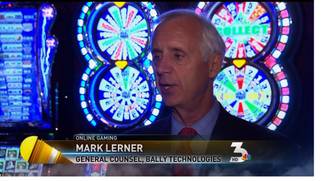Internet gaming licensing in Nevada

Viewing video requires the latest version of Adobe's Flash Player
KSNV reports that Bally Technologies becomes the first company to be fully licensed for online gambling, June 21.
VEGAS INC coverage
If a foreign online gaming company took wagers from U.S. customers before the Unlawful Internet Gambling Enforcement Act was enacted, should that company be banned from being licensed in Nevada?
That was one of several philosophical conversations members of the Gaming Policy Committee had Wednesday as the 11-member panel wrapped up business with five policy recommendations that will go to Nevada lawmakers in advance of next year’s legislative session.
In 2011, lawmakers approved legislation permitting the licensing of companies to enable Internet poker play within the state, and regulators have drafted regulations and standards for licensees. So far, two companies — Bally Technologies and International Game Technology — have been licensed, and a third license for Shuffle Master will be considered by the Nevada Gaming Commission on Thursday.
While the committee, formed by Gov. Brian Sandoval late last year to address future Internet gambling issues, conducted its final meeting, it’s likely that an expanded committee will meet again in the future to address other issues as a means of preserving the state’s position as the world’s top gaming regulatory environment.
“We’ve had some of the sharpest minds in our state make presentations that have helped us preserve Nevada’s leadership role in gaming,” Sandoval said. “I found the presentations extremely valuable and may call on the committee again.”
Expanding the committee with an academic presence was one of the committee’s five recommendations. Following a presentation by Don Snyder, dean of UNLV’s Harrah College of Hotel Administration, and Bo Bernhard, executive director of UNLV’s International Gaming Institute, committee members recommended adding a 12th member to the committee, a representative of the state’s academic community, and endorsed a proposal to leverage the universities’ gaming research as a means to keep the state at the forefront of the industry.
Other recommendations from the committee:
• For the Legislature to make modifications to statutory barriers affecting online gaming regulation.
• To reaffirm the importance of the state’s regulatory standards regarding controls on participation by minors, by other vulnerable persons and by persons located in jurisdictions that don’t allow online gaming.
• To re-enforce the state’s regulatory standards in pre-licensing qualifications and post-licensing operations to protect the integrity of online gaming, to avoid criminal or corruptive influences and to protect the public through funds deposited for online gaming.
• To support the concept of using executive compacts or other arrangements with officials and regulators in other states and countries, to provide uniformity of regulation and to preserve levels of competition for licensed Nevada businesses without reducing effective gaming control.
Philosophical discussions dotted the committee’s debates on legislative recommendations.
While the committee initially discussed specific ideas about how to best regulate online gaming, committee members Peter Bernhard and Mark Lipparelli, who chair the state’s two regulatory bodies, the Nevada Gaming Commission and the state Gaming Control Board, suggested establishing general policies in legislation that would allow regulators to draft more specific standards.
For example, when discussing modifications to current online gaming regulation, the committee refrained from suggesting specific geo-location technology to determine from where a player was gambling because advances in technology could change the best method of identifying the location of a player.
Regulators may draft rules requiring online gaming licensees to submit quarterly reports on the number of minors or persons playing from areas where gaming isn’t allowed who illegally attempt to play online and are detected by screening programs.
Committee members also refrained from recommending definitive rules on whether a foreign company should be banned from being licensed in the state for taking wagers that could have been interpreted as a violation of U.S. laws — a position strongly advocated in public comment by gaming technology supplier Derek Webb.
Lipparelli assured committee members that suspected illegal activity is uncovered in the state’s exhaustive investigations of license applicants and that he preferred specific circumstances be reviewed on a case-by-case basis.
Peter Bernhard added that some of the early pioneers of Nevada gaming had checkered pasts before the state’s regulatory regime took hold.
The committee recommended enabling Nevada to develop compacts with other states to allow more players to participate in online gaming. Experts have said Nevada may not have the population base to make Internet poker financially viable to companies if only in-state residents can play.
Sandoval said he has not been in contact with governors of other states to discuss potential compacts, but Lipparelli has communicated with regulators of other states to begin conversations with other jurisdictions about regulatory standards and how revenue would be split. He wouldn’t say what states or countries he has contacted.
Earlier in the meeting, Snyder, the former president of Boyd Gaming, and Bo Bernhard, who is the son of the Gaming Commission chairman, made their proposal for the governor to appoint “the Intellectual Capital of Gaming leadership group” — comprised of academic, regulatory and industry leaders — to develop policies to keep Nevada ahead of other state and foreign gaming jurisdictions.
Snyder and Bo Bernhard pledged to use the resources of UNR’s Institute for the Study of Gambling and Commercial Gaming, headed by William Eadington, in efforts to keep the state ahead of other locations.
“There are not too many opportunities in life when you can be the gold standard,” Bo Bernhard told the committee. “We are the gold standard of the industry now, but we need to keep investing in our programs to stay that way.”
Bo Bernhard said he isn’t seeking additional funding for the group’s efforts and that the university has the financial resources it needs for the proposal.